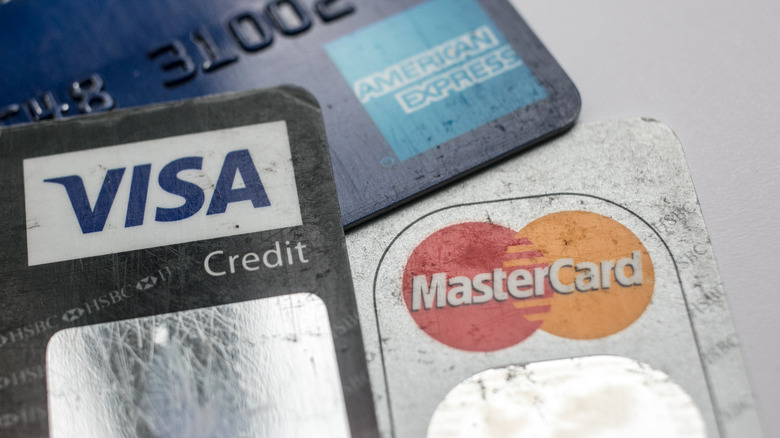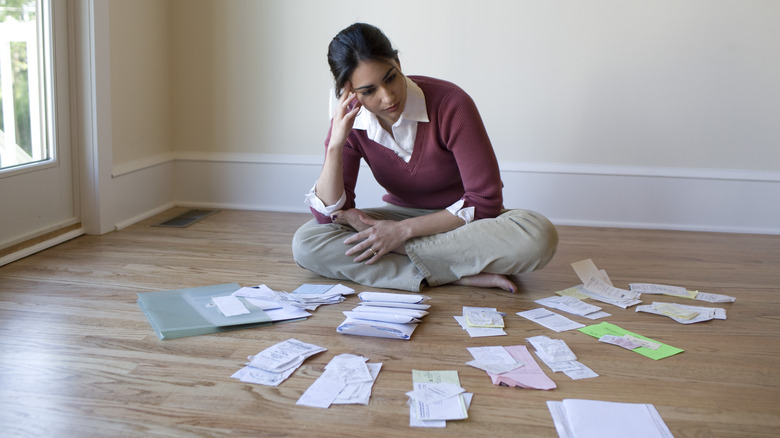What Happens When You Only Make The Minimum Payment On Your Credit Card
Credit card perks have gotten more creative in recent years, offering potential customers the promise of cash-back rewards, travel points, and even free food delivery subscriptions. These perks can incentivize certain credit cards over others, and lure would-be customers into sometimes strict cardholder agreements with high annual fees. Annual fees can be painful, but they're nothing compared to most variable interest rates. Exorbitant APRs (the interest rate on paying back your purchases after the end of your statement month) can overshadow cushy credit card perks, setting a compounding debt trap you don't want to fall into.
While many people might think they'll never have to worry about these interest rates because they plan on always paying off their balance, we are here to remind you that the road to hell is paved with good intentions. Case in point: As of the end of the second quarter of 2023, U.S. credit card balances had grown 4.6% and now total $1.03 trillion.
This sorry state of affiars, combined with the fact many Americans are barely holding on in the face of rising housing prices and inflation, makes it unlikely that a zealous credit card user will be able to reliably maintain a zero balance month in and month out. While it's still better to make the minimum payment instead of — say — not paying off your credit card balances at all, there are still far too many downsides for it to be part of an ideal personal financial plan.
Minimum credit card payments lead to debt spirals
Terms vary widely, but most credit cards offer some riff on the same Faustian bargain: Spend money you don't have and pay it back in 30 days, or else get charged double-digit interest on the outstanding balance. If you fail to make even the minimum payment, you will be subject to additional fees right on top of the exorbitant APR. Penalties may even include a triggering of higher penalty APRs, passing on the punitive costs to include some percentage of your entire balance.
If you're making your minimum payment, you don't have to worry about these punitive measures, but if you're only making your minimum payment then you're still going to be grappling with compounding APRs. Most minimum payments are low enough that a significant portion of your balance is left over to trigger this non-penalty interest. Therein lies the danger: An inexperienced credit card user might feel like they are following all the rules by making minimum payments, and while that's technically true, they'll still be racking up massive interest charges month to month. Since the added interest rates increase the overall amount you will need to pay off, getting out of debt can become a much longer process. Plus, as your credit card balance increases so does your credit utilization ratio, which can have a significant impact on your credit score, and not necessarily in a good way.
Is it ever okay to pay the minimum on your credit card?
Life happens, and emergencies can affect your finances. While in an ideal world, your savings would be able to help cushion any emergency costs, sometimes it ends up being necessary to pull payments and financial obligations from other parts of your budget (like your credit card payments) to offset unexpected expenses. It's important to remember that paying only the minimum on your credit card balance is not the end of the world. The key thing to keep in mind is that this should only be used as a temporary solution. Ensuring that minimum payments are a short-term plan or strategy, and not the norm, can keep your financials healthy long-term.
The most important thing to remember is to at least pay the minimum amount required on these balances, or you could face late fees. These fees quickly add up, and late payments negatively impact your credit report and credit score, making it harder to rent an apartment, qualify for a loan, or get a new credit card in the future. It's also important to recognize if you have a pattern of financial strain. If you find you have to regularly make minimum payments due to fluctuating income, it might be worth taking a deep dive into your personal financials. By reviewing your spending habits, you might gain clarity on potentially problematic budgeting issues. Having this knowledge can help you create a better budget for yourself and your family.


